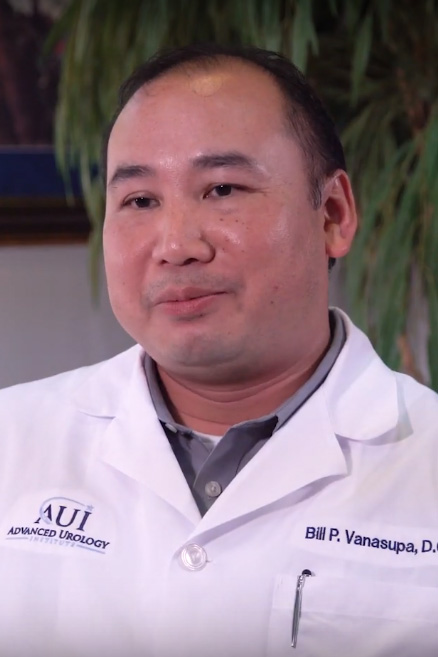PROSTATE CANCER
PROSTATE CANCER

A person hears the prognosis, the urological doctor’s conclusion after many exams and tests, that he has advanced prostate cancer. What does that mean? Can it be treated? What kind of life may one expect from that point onward? There are many questions that can be asked of the doctors, but a patient must remember that many questions depend on current medical techniques, the combined experience of all the doctors involved, and how well their clinics are equipped. Advanced prostate cancer is any cancer that has spread, or metastasized, to other tissues or bones around the prostate gland, so no single cure can exist for it. The cancer can no longer be treated by focusing on the prostate gland alone, so it is no longer “curable” in the simple sense. The most important questions are how well the cancer can be controlled or how long it can be kept in remission.
There are many factors that determine how much longer an advanced prostate cancer patient can survive. Age, along with other associated health issues, is more often of greater significance than the prostate cancer. Most men with prostate cancer will die from old age or other illnesses rather than from the cancer itself.
Prostate cancer occurs mainly in older men, with more than 80 percent of cases seen in men older than 65 and less than 1 percent observed in men younger than 50. Men who eat lots of high-fat diets such as red meat have a higher risk of getting the disease. Studies have shown that the disease is more common among men who consume meat and dairy products regularly than in those who eat vegetables, rice and soybean products. Fats increase the amount of testosterone in the body and in turn speed up the growth and spread of prostate cancer. Men from families with a history of the cancer are at a higher risk, as are welders, rubber workers, battery manufacturers and men frequently exposed to metal cadmium. Failure to exercise regularly also may make the cancer more likely.
Essentially, the factors that determine a patient’s longevity after diagnosis are:
- the age of the patient
- the condition of a person’s overall health
- what stage the cancer is in
- what the physical symptoms are
- where the cancer may have spread
- if the cancer has infected any bones
- a patient’s outlook on life
- a patient’s social life
Each person is different, which makes the determination of how much longer a person may live more like an educated guess rather than a precise mathematical equation. In other words, no doctor can ever state with complete certainty how long a person with any advanced cancer could live. Each person also responds differently to the same types of treatments. Other issues that cannot be overlooked, but also differ from person to person, are their mental outlook on life and social support; doctors cannot prescribe friendships or worldviews, though they can suggest support groups that help people with similar problems learn to cope with their situations.
When a patient is diagnosed with advanced prostate cancer, what medical care is available becomes very important. In a large specialist clinical network, its many doctors regularly share new knowledge and interesting experiences with each other, so a patient is always assured of receiving the best care possible. Thanks to modern advanced medical treatments, such as available through the Advanced Urology Institute, a patient’s hope for longevity after a diagnosis is now considerably better. For more information, visit the Advanced Urology Institute website.
Surgery
A patient with prostate cancer can choose to have the prostate surgically removed to clear the cancer from the body. The procedure is known as Radical Prostatectomy. It is most appropriate in cases where the cancer is localized and has not spread beyond the prostate. However, even when the cancer is localized, a urologist will determine the progression of the disease before recommending surgery. Low risk localized prostate cancer is unlikely to progress and a radical prostatectomy is unnecessary. On the other hand, when the cancer is aggressive and is likely to result in death if untreated, surgery is definitely the most appropriate choice.
Radical prostatectomy is recommended for patients under the age of 75 , or those with a life expectancy of at least ten years. This is because they are more likely to preserve their sexual and urinary functions after the surgery and they have a stronger chance of outliving any side effects the surgery might have.
Radiation Therapy
Radiation therapy, or radiotherapy is the use of radiation in high doses to kill malignant cancer cells or slow their development. Unlike radical prostatectomy, it can be used to treat localized prostate cancer and even advanced prostate cancer. It may be applied in combination with other treatment options such as hormone therapy. It may even be applied if a patient undergoes a radical prostatectomy but the procedure fails to eliminate the cancer fully or if the cancer recurs.
Radiation therapy can be administered externally or internally. When done externally, it is referred to as external beam radiation and is very much like having an X-ray. When administered internally, it is referred to as brachytherapy or internal radiation therapy. In this procedure, a radiation implant is placed inside the body near the affected organ. After a while, the implant ceases to produce radiation. The implant, however, remains in the body.
Both radical prostatectomy and radiation therapy are suitable treatment options and choosing between them may seem a little daunting. The professional opinion of a urologist can help by pointing out the finer points of each choice. The patient also may research the subject by reading up on the various options. There are many sites that offer reliable material on this subject.
Pharmacy services for Advanced Prostate Cancer patients
If you have been diagnosed with Advanced Prostate Cancer and have been prescribed medication, we may be able to help lower your costs. Click here to learn more about our in-house pharmacy services.
PHYSICIANS WHO SPECIALIZE IN
PROSTATE CANCER




STAY IN THE KNOW






Choosing Between Surgery and Radiation Therapy for Prostate Cancer


Navigating Prostate Health – When to Consider a PSA Test



















